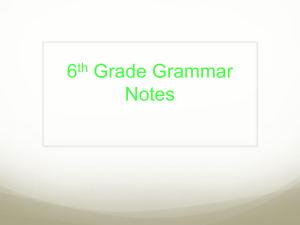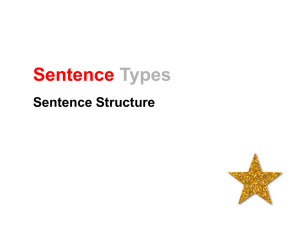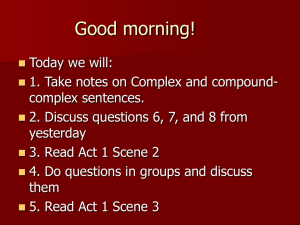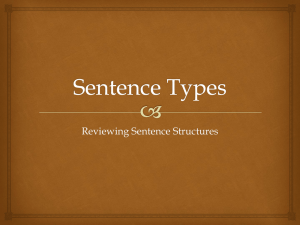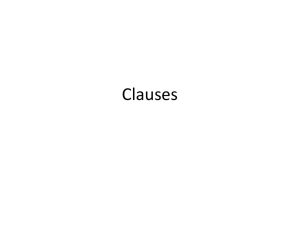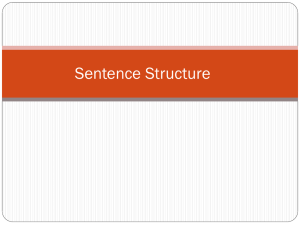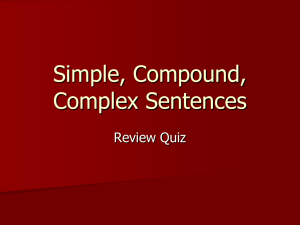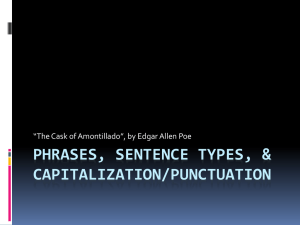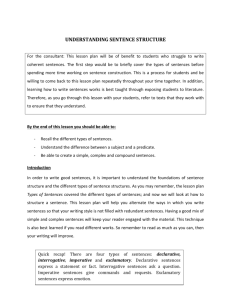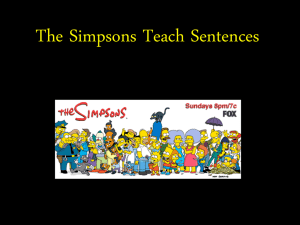simple and compound sentences - ppt
advertisement
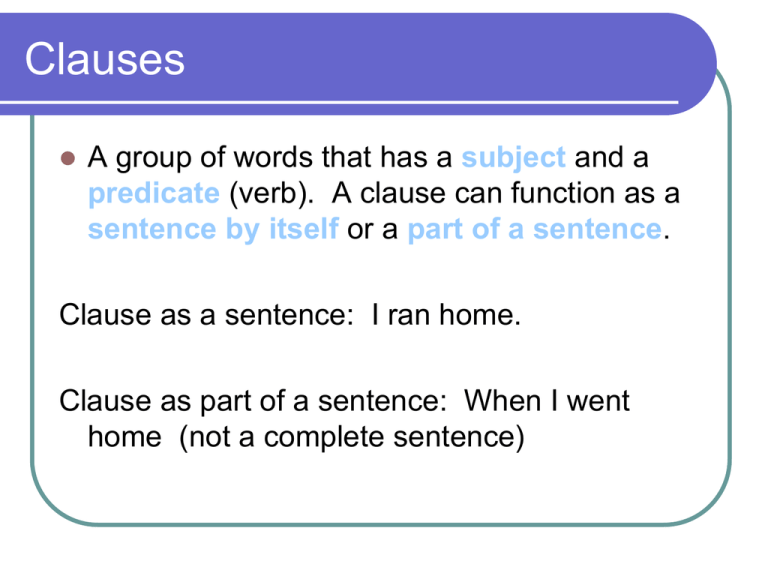
Clauses A group of words that has a subject and a predicate (verb). A clause can function as a sentence by itself or a part of a sentence. Clause as a sentence: I ran home. Clause as part of a sentence: When I went home (not a complete sentence) Main Clause Has a subject and a predicate and expresses a complete thought. Can stand alone as a complete sentence. Is also known as an independent clause. EX: The cast bowed, and the audience applauded. Simple Sentences Has one complete subject and one complete predicate. A simple sentence contains one main clause (independent clause) and no subordinate clauses. The subject, the predicate, or both may be compound. Simple Sentences EX: Valerie ran her fingers through her long, straight hair. EX: That song always melts my heart. EX: Jan and Steve walked to the grocery store. Compound Sentences Contains two or more simple sentences. Contains two or more main clauses (independent clauses) but no subordinate clauses. Compound Sentences Punctuation Use a comma followed by a conjunction to combine two main clauses/two simple sentences. Conjunctions: and, or, but EX: I may seem calm to you, but inside I’m really quite nervous. Compound Sentences A semicolon may also be used to join two main clauses to form a compound sentence without a conjunction. EX: Get used to hearing a racket; Glenna’s moving next door. Compound Sentences A semicolon is also used before a conjunctive adverb, such as: moreover, however, therefore, etc. EX: I was nervous about asking Marcia to dance; therefore, I stumbled on my way across the room. Practice: Make a compound sentence out of the following two independent clauses. Spring arrived late this year Mona’s garden was as beautiful as ever. EX: Spring arrived late this year, but Mona’s garden was a beautiful as ever. Spring arrived late this year; Mona’s garden was beautiful as ever. Spring arrived late this year; however, Mona’s garden was as beautiful as ever. Practice: Write in the blank whether the sentence is simple or compound. 1. 2. 3. 4. 5. 6. ________ Dave Matthews sings and entertains. ________ The entire crowd waited quietly, and Nicki made the basket. ________ The old car’s engine sputtered and died. ________ Reading is a great past time; therefore, students read all of the time. ________ The students were wishing for a break, but the grammar kept coming. ________ I love writing sentences. Subordinate Clause Contains a subject and a predicate but cannot stand alone. It depends on a main clause, so it is also known as a dependent clause. Does not express a complete thought. EX: When the dog barked… (needs something more) Subordinating Conjunctions Usually, a subordinating conjunction introduces a subordinate clause, although it can be a relative pronoun or relative adverb. Subordinate Conjunction Subordinate Conjunction Relative Pronoun Relative Adverb After As if As though Who When As As soon as Because Whose Where Before Inasmuch as Whom Why Since So that Which Before Although Even though Though That Until If What When Whenever Than While Unless Where Wherever Practice: Underline the main clauses once and the subordinate clauses twice. 1. 2. 3. 4. 5. Unless Tony goes with us, we won’t know how to get there. The park where we used to play is now the location of a mall. My brother bought some stamps yesterday, and he placed them with his collection. Ed and I checked and rechecked our answer. Kelin cleaned her room before she left for the party. Complex Sentences Contains one main clause (independent) and at least one subordinate clause (dependent). Subordinate Clause EX: When Beth takes pictures, she prefers black and white film. Main Clause Complex Sentences EX: Emily breaks out in hives whenever she eats strawberries. EX: While it rains, the twins love to splash in the puddles. EX: We’ll have pizza for supper tonight if we get home before the store closes. EX: Our band, which won the trophy, will perform after the game is over. Practice: Identify each sentence as simple, compound, or complex. 1. 2. 3. 4. 5. 6. ________ Daises are my favorite flower. ________ Everyone stopped talking as the curtain rose. ________ When Sammy practices the violin, the dog howls. ________ Roses bloom in temperate climates, and they bloom on shrubs. ________ Although she is the shortest person on the basketball team, Sheila has the highest shooting percentage. ________ After he stole our cheese, we chased the mouse. Compound-Complex Sentences Contains two or more main clauses (independent) and at least one subordinate clause (dependent). EX: After the game was over, some of the class went for pizza, but most of us went home. Compound-Complex Sentences EX: Whenever we have an ice storm, the twins go skating, and I enjoy the peace. EX: I ran down the path to the spot where it divides, and then I turned back. EX: Unless I’ve misunderstood the store clerk, the package should arrive next Thursday; however, it may have to be back-ordered. Practice: Identify each sentence as simple, compound, complex, or compound-complex. 1. 2. 3. 4. 5. 6. ________ If it rains, Sue will cover the firewood with a plastic sheet, and Keith will close the windows. ________ Although he had hired the best advertising company in the east to promote him, the candidate still lost the race. ________ When roses do have a scent, it is quite noticeable, some people even think the rose fragrance is too heavy. ________ Roses are also eaten in salads and jellies. ________ I read Frankenstein, which Mary Shelley wrote, and I reported on it. ________ I love grammar even though it is difficult.
